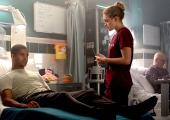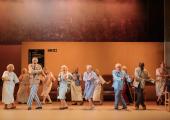Leah Hazard: Hard Pushed review - a midwife's tales

A dark book written with a light hand
This layered medical memoir by practicing midwife Leah Hazard unpacks riveting tales of all kinds of deliveries and is underpinned by distress at the parlous nature of the understaffed and overworked NHS.
Mark Thomas, BAC review - impassioned polemic about the NHS

A love letter with a warning
Mark Thomas issues a health warning for Check-Up: Our NHS at 70 at Battersea Arts Centre – “This show contains swearing, a video of an operation on a stomach and a description of being in A&E when a patient dies.” Indeed it does, but it also contains a heartfelt love letter to the health service Thomas was born in and, as a lifelong socialist, hopes to die in. But as he points to creeping commercialisation, what are the chances of that being so?
Trust Me, Series 2, BBC One review - hospital killer chiller

Beware the angel of death stalking the wards
Great, a new drama not by the Williams brothers. Instead it’s Dan Sefton’s second iteration of his medical thriller Trust Me, last seen in 2017 starring Jody Whittaker. Since she’s off being Doctor Who, the new series has a new cast, with John Hannah as Dr Archie Watson and Ashley Jensen as physio Debbie Dorrell.
Lavinia Greenlaw: In the City of Love’s Sleep review - curated lives

Falling in love in middle age and the complexities of responsible lives
Allelujah!, Bridge Theatre review - hilarious but dark, darker, darkest

Alan Bennett's black comedy is a howl against the privatisation of death
The NHS is us. For decades our national identity has been bandaged together with the idea, and reality, of a health service that is free at the point of delivery.
Summer 1993 review - the tenderest fabric of childhood

Aching sensitivity and directorial magic in an outstanding Catalan debut
Carla Simón’s debut feature Summer 1993 is a gem of a film by any standards, but when you learn that its story is based closely on the thirtysomething Catalan director’s own early life, its intimacy becomes almost overwhelming.
Christie Watson: The Language of Kindness review - tender memoir, impassioned indignation

Movingly remembering her first career, the novelist tells 'A Nurse's Story'
Anecdotal story-telling wrapped up in hypnotic prose, Christie Watson’s narrative is a gentle, emotive five-part layered package of reflection and indignation.
Barbara Ehrenreich: Natural Causes review - counterintuitive wisdom on the big issues

From challenging medical myths to making sense of the great unknowns, a bravura perspective
“Wham bam, thank you, ma’am” might be one response to this polemical, wry, hilarious and affecting series of counterintuitive essays by one of the most original and unexpected thinkers around. Barbara Ehrenreich has described herself as a “myth-buster”, and her many books have challenged in an eminently readable fashion all kinds of assumptions that we automatically take for granted and never query, which may easily not only distort our attitudes but actually damage our behaviour.
Trauma, ITV, review - surgically imprecise revenge drama
Great performances by John Simm and Adrian Lester, but Mike Bartlett's in too much of a hurry
When you’re hot, you’re hot.

